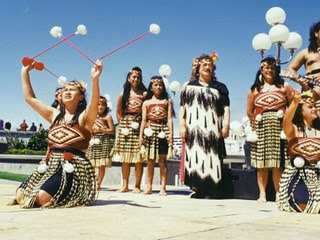 Waitangi Day − w Nowej Zelandii istniejące od 1934 roku świeckie święto państwowe, obchodzone co roku 6 lutego, ustawowo wolne od pracy począwszy od roku 1974. Święto ma na celu upamiętnienie podpisanego 6 lutego 1840 roku traktatu Waitangi, zawartego pomiędzy przedstawicielami ok. 500 maoryskich plemion z jednej i władzami Zjednoczonego Królestwa Wielkiej Brytanii i Irlandii z drugiej strony. Traktat ustanowił urząd gubernatora kolonii Nowej Zelandii,
uznał maoryską własność ziemi i wszelkich innych dóbr oraz nadał im
prawa obywateli brytyjskich. Dokument jest uważany za akt założycielski
nowoczesnej Nowej Zelandii. (Wikipedia)
Waitangi Day − w Nowej Zelandii istniejące od 1934 roku świeckie święto państwowe, obchodzone co roku 6 lutego, ustawowo wolne od pracy począwszy od roku 1974. Święto ma na celu upamiętnienie podpisanego 6 lutego 1840 roku traktatu Waitangi, zawartego pomiędzy przedstawicielami ok. 500 maoryskich plemion z jednej i władzami Zjednoczonego Królestwa Wielkiej Brytanii i Irlandii z drugiej strony. Traktat ustanowił urząd gubernatora kolonii Nowej Zelandii,
uznał maoryską własność ziemi i wszelkich innych dóbr oraz nadał im
prawa obywateli brytyjskich. Dokument jest uważany za akt założycielski
nowoczesnej Nowej Zelandii. (Wikipedia)

Fun fact: More people live in the city of Auckland on North Island than in the whole of the South Island! ;)
The Lord of the Rings movie trilogy was filmed entirely in New Zealand!!!
More info: http://www.newzealand.com/in/feature/lord-of-the-rings/
Films about New Zealand:
 Kiwis are flightless birds native to New Zealand, and have become a
symbol and nickname for New Zealanders all over the world. They are
about the size of a chicken.
Kiwis are flightless birds native to New Zealand, and have become a
symbol and nickname for New Zealanders all over the world. They are
about the size of a chicken.
Kiwis are unusual because they have the largest eggs, in relation to their own body size, of any bird in the world.
Kiwi to ptak, który mieszka z Nowej Zelandii. Nie umie latać.
Żyje w parach, wiedzie nocny tryb życia. Żywi się owadami, robakami, owocami, czasem gadami i płazami. Młode przychodzą na świat dobrze rozwinięte. Opiekuje się nimi przez jakiś czas samiec. Nazwa tego ptaka pochodzi od dźwięku „kiwi”, którym samce nawołują samice w okresie godowym.
Według danych nowozelandzkiego departamentu ochrony przyrody, obecnie 9 na 10 piskląt wykluwających się w środowisku naturalnym pada ofiarą drapieżnych ssaków już w pierwszym roku życia.







Brak komentarzy:
Prześlij komentarz
Uwaga: tylko uczestnik tego bloga może przesyłać komentarze.